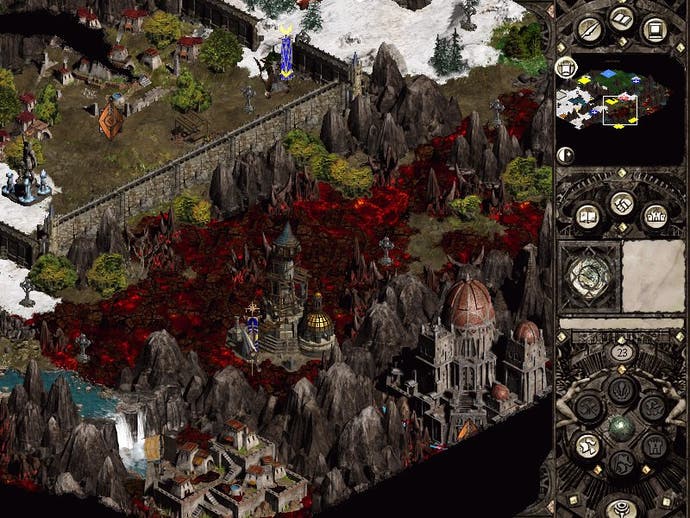Disciples II: Dark Prophecy
Quick Take - a role-playing strategy game with a difference
Disciples II has been available in America for several months now, but thanks to the efforts of Arxel Tribe and Mindscape the game is finally available on our side of the pond this month. Picking up where the original Disciples left off, the sequel is a role-playing strategy game along the lines of Heroes Of Might & Magic, putting you in control of the destiny of one of four factions - the human Empire, the dwarven Mountain Clans, the Undead Hordes and the Legion of the Damned. Each faction has its own campaign (or "saga"), and we'll give you one guess as to which of these is the most entertaining...

Streamlined
Although at first sight Disciples II looks a lot like its turn-based strategy brethren, it offers a slightly different take on the genre, doing away with many of the more tedious elements usually found in this kind of game. Instead of rushing around the map hoovering up resources and capturing mines, your heroes are left to get on with the important business of fighting monsters and capturing enemy towns, as every town you own exerts an influence on the terrain surrounding it. Each turn the terrain under your control will expand a little, and once a mine or mana source is in your territory you automatically gain resources from it. If a river gets in the way of your progress or you need to spread your control more rapidly, one class of hero unit on each side is capable (for a price) of planting magical rods which gradually change the land around them.
As well as helping you to control the land around them, towns also act as supply bases where you can buy new units and heal wounded soldiers. But whereas in Heroes you need to build up each town separately, in Disciples you simply expand your central citadel and the facilities you have there extend their influence to the rest of your realm. For example, once you've built a temple in your citadel you can heal and resurrect units in any of your towns, assuming you have enough cash. Which buildings you place in your citadel also determines the upgrade path of your units, all of which gain experience from any battle they survive. By focusing on smaller battles (each army contains a maximum of six units) and allowing soldiers as well as heroes to improve their abilities over the course of a mission, Disciples makes the individual soldiers more than mere cannon fodder.
Sadly you can only carry heroes over from one mission to the next, not the men they lead, but because the upgraded versions of units are often much more powerful than the base unit they started out as, keeping your grunts alive can land you with a devastating army by the end of a mission. And as long as at least one unit emerges from the battle alive, you can always hobble back to the nearest town afterwards and resurrect any troops you've lost, even if your leader is amongst the dead. This makes battles less of an interruption than in other similar games, and means you don't have to worry so much about losing a hero in battle. In a break from genre tradition, you can even grind down a more powerful enemy by throwing multiple armies at them - any damage that you cause carries over, and units only heal very gradually unless they have potions or spells to aid them.
Conclusion
Even after many hours playing Disciples II, I've still only scratched the surface. The game offers lengthy campaigns for all four sides, as well as a selection of stand-alone quests which can be played from more than one perspective, and the inclusion of both online and "hot seat" multiplayer options further adds to the replay value. If you're only going to buy one turn-based role-playing strategy game this year and you fancy something slightly different, this could be just the ticket.

